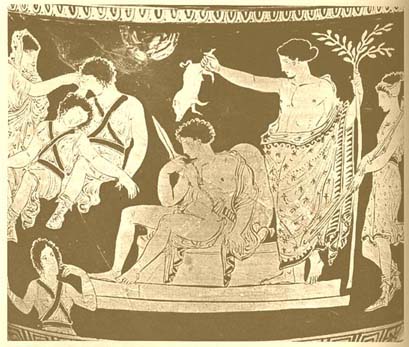Healing and Transformation
Purification & Sacrifice

The Sacrifice and The Pig
The pig is the sacrificial animal most often related in several different interpretations of the Mysteries at Eleusis. In one presentation, Euboleus was a swineherder, and when the earth gaped open to swallow Persephone, he was near the sight and his herd was swallowed up with the virgin. Their screams most closely resemble the sound of human cries than any other animal. It, along with the Brazen Gong and the Tympana Drum were the sounds of Eleusis.
It was also related that in ancient times, the Mystai enroute to Eleusis carried a piglet to be purified in the sea, and then taken to sacrifice in the pits prepared, and later these remains were retrieved to use as fertilizer for the next years crop. A later tradition was recounted that after the sacrifice, the entire region of Eleusis smelled of roasting pork and the meat may or may not have been consumed as part of the sacrifice. One common theme pervades in each of these interpretations - the pigs were sacrificed.
The pig was sacred to both mother and daughter and represented the Great Sacrifice, it's blood being charged with a portion of their divinity. To eat the flesh of a sacrifice is to become one with it - the very resurrection of life from death. The Sow Goddess acts as an epiphany of the Lady of the Plants. Demeter often carries a torch and under her arm a small terra-cotta pig; thereby her connections to the underworld are explicit. On the coins of Eleusis a pig stands upon a flaming torch.
The sacrifice is a gift of commitment to the new, and an atonement for the past in relating to our lives and aspirations. Therefore, it must come from the heart. It's essence is symbolic of a small death to past fear or regret. As it is killed, or sacrificed so is the sacrificer to the past from which he wishes to transcend. The things to be considered would be those which restrict movement of the spirit to the divine fire of rebirth, wherein all dross is burned away. The fire which burns, but does not consume.
"The initiate at Eleusis was vividly reminded of her own death, to be sure, when she (or he) was obliged to sacrificially slaughter a pig, whose body was thrown into a noisesome pit with scores of others. Anyone who has ever bred pigs will appreciate not only their uncanny, almost human intelligence but also the horrendous shrieks they let out when they sense impending death. The sacrificial pig stood as a chilling ritual substitute for the human initiate who would, of course, die one day herself. Doubtless it was intended as part of a ritual meditation on the attendant terrors of death, but perhaps, too, it contained an inescapable reminder of the transformational mysteries of the Earth Mother. The great Renaissance physician and alchemist Paracelsus, who understood the power of nature (which he called lumen naturae, or the "light of nature") may help us understand the mystery in the following extraordinary passage: "Decay is the beginning of all birth...It transforms shape and essence, the forces and virtues of nature...Decay is the midwife of very great things! It causes many things to rot, that a noble fruit may be born; for it is the reversal, the death, and destruction of the original essence of all natural things. It brings about the birth and rebirth of forms a thousand times improved. .......And this is the highest and greatest mysterium of God, the deepest mystery that He has revealed to mortal man."
Risk
To laugh is to risk
appearing the fool.
To weep is to risk
appearing sentimental.
To reach out for another is to risk
involvement,
To expose feelings is to risk
exposing your true self.
To place your ideas, your dreams
before the crowd is to risk
their loss.
To love is to risk
not being loved in return.
To live is to risk
dying.
To hope is to risk
despair.
To try is to risk
failure.
But, risk must be taken,
because
the greatest hazard in life
is to risk nothing.
The person who risks nothing,
does nothing,
has nothing and is nothing.
He may avoid suffering and sorrow, but he simply cannot
learn, feel, change, grow,
love....live.
Chained by his certitude's,
he is a slave,
he has forfeited freedom.
Only a person who risks....is free.